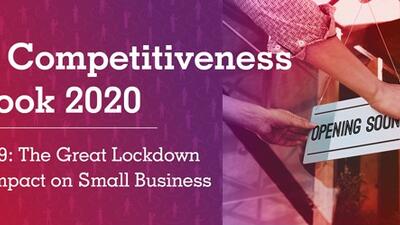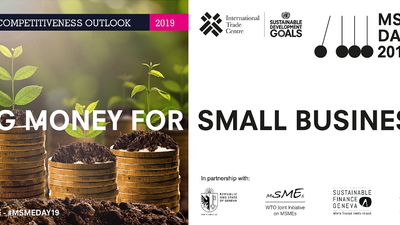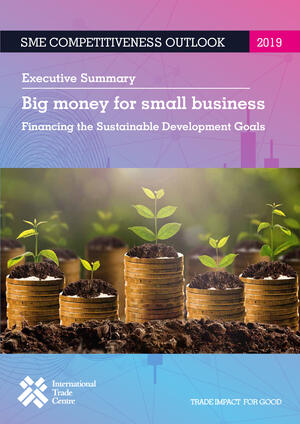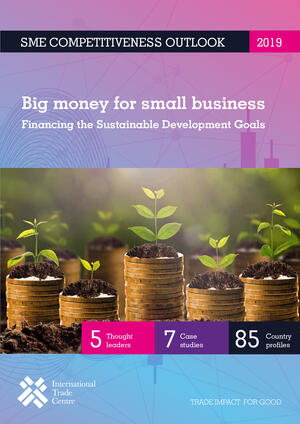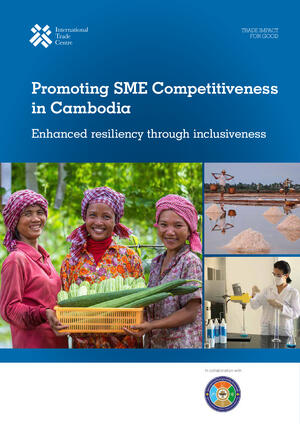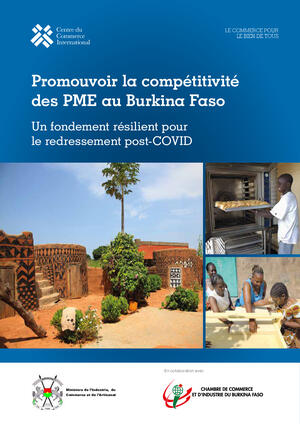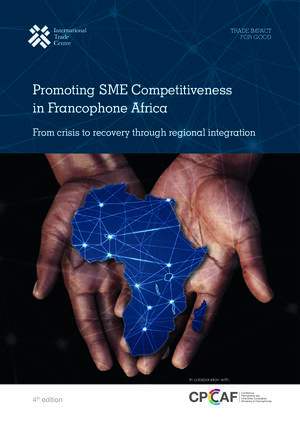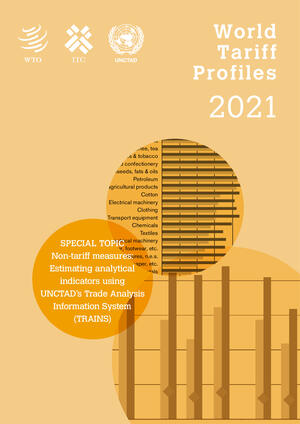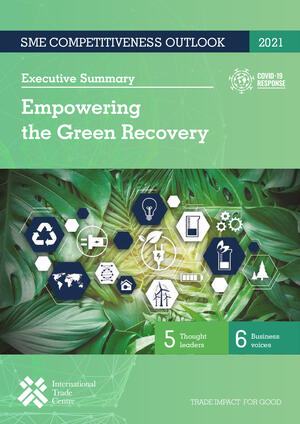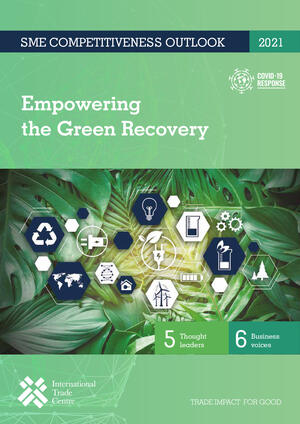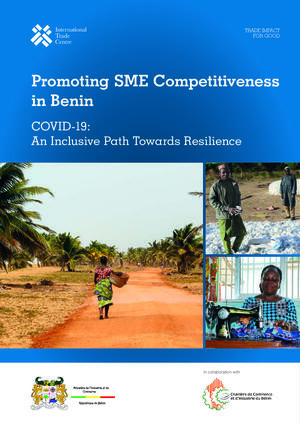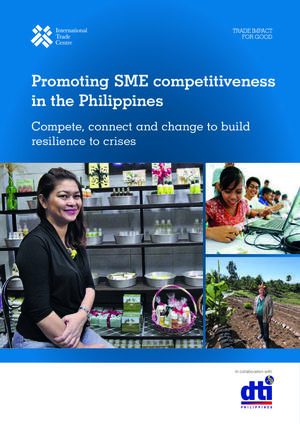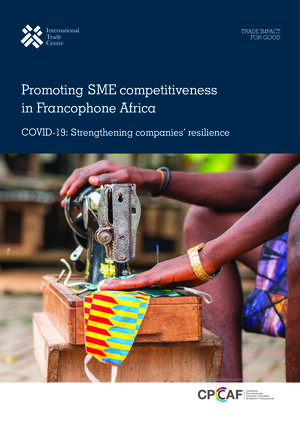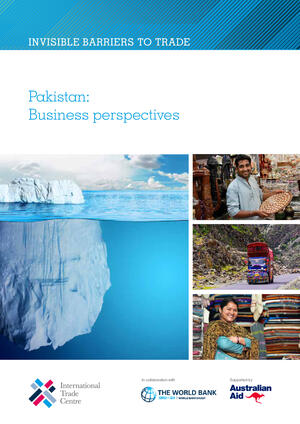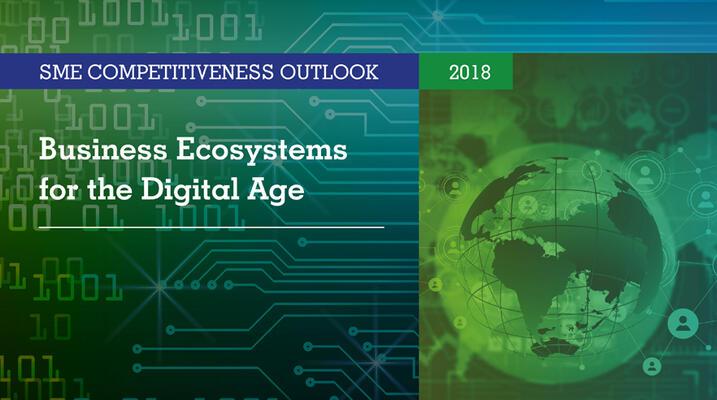
How to make the digital revolution work for inclusive growth
Digitalization and the rise of the platform economy are changing the way firms do business. To thrive amidst these changes, small firms need strong business ecosystems.
ITC’s SME Competitiveness Outlook 2018 explains how to make big data work for small firms, how to focus today on building skills for tomorrow and how to foster public trust in new technologies.
(Geneva) – Digitalization and the rise of the platform economy are rapidly changing the ways firms do business. For small and medium-sized enterprises (SMEs), these changes affect most aspects of their daily operations, including their access to information, suppliers, clients, finance and logistics. They present major commercial opportunities – but also potentially fatal threats.
Meanwhile, political and economic actors in many places are facing an unprecedented loss of trust. The current technological revolution, if not managed well, could worsen this loss of trust and add fuel to the existing backlash against trade.
Released today, the 2018 edition of the International Trade Centre’s SME Competitiveness Outlook looks at how these changes affect the SMEs that account for the vast majority of jobs and businesses. Building on data analysis, case studies and contributions from thought leaders in government and the private sector, the report draws a picture of a world in which new technologies shorten distances, help SMEs access customers on other continents and open opportunities for least developed countries to become drivers of regulatory innovation. Yet this world runs on big data that is in the hands of a few big players, and is merciless to firms that cannot adapt to the changes.
The report argues that broadening access to the benefits of digitalization would make trade and growth more inclusive. It addresses questions central to making this happen:
- How can big data be tailored to the needs of small enterprises?
- Which skills do SMEs need to cope with technological change?
- What can be done to instill trust in new technologies and to facilitate their use by SMEs?
- How can last mile gaps in transport and ICT infrastructure be overcome?
Make big data work for small firms
For SMEs, access to market relevant information is one of the main bottlenecks to connecting to international value chains. Trade and investment promotion organizations (TIPOs) have traditionally provided small and medium-sized exporters with such information as part of their services. This report shows that tailoring support to businesses works: for instance, for a constant budget, increasing spending by 10% on new would-be exporters leads to a 4.6% rise in the number of exporters per destination.
New technologies and data platforms have the potential to profoundly transform the way TIPOs deliver market information to their clients. Big data, in principle, provide endless opportunities for SMEs to obtain relevant market information. Yet there is uncertainty over whether the large companies that dominate the collection and analysis of market data will be interested in tailoring the information they command for SMEs. In addition, smaller businesses are particularly vulnerable to abuse of market power by dominant players. The report describes steps TIPOs can take to make big data work for small firms. For instance, Switzerland Global Enterprise, the Swiss TIPO, has partnered with Google to develop an online platform that shows Swiss SMEs how to identify and enter attractive export markets, saving them expensive market research.
Build skills for tomorrow: no time for perfect solutions
Rapid shifts in the skills that enterprises require from employees put enormous pressure on countries’ education and training systems to adjust. Yet, in many countries those systems are notoriously inflexible, portending serious challenges.
SME Competitiveness Outlook 2018 urges training and educational institutions to anticipate, act and adjust to change as rapidly as possible. Collaboration with private-sector players is necessary, though not without risks: today’s successful gazelles may be extinct tomorrow. Yet there is no time to design perfect solutions. Vocational education providers are advised to identify the most successful national players in new technologies and find ways to involve them in curriculum development and training programmes.
Quality assurance bodies can foster trust in the digital economy
For markets to function well, they need quality control and monitoring mechanisms. Starting with the rise of mass industrial production, countries have set up elaborate institutions – standard-setting and certification bodies, testing facilities, and the like – to ensure product safety and facilitate commerce.
Many of the new products and processes emerging from the digital economy contain quality aspects that are not immediately obvious to SMEs or even to consumers. Are the customer comments on hospitality webpages authentic, or manipulated? How secure are electronic banking tools? What is the likelihood that a self-driving car will crash?
SME Competitiveness Outlook 2018 sets out an agenda for countries’ quality infrastructure to be speedily adapted for the digital age. It calls on them to:
- Ensure trust for digital goods;
- Promote interoperability among digital products;
- Address privacy and security challenges.
While regulation is often associated with burdens on business, it has a critical role to play in fostering innovation and competition by creating a more secure and predictable environment – and in consolidating consumer trust. Amid technological disruption, it is difficult but important to strike the right balance.
Once standards and regulations in the digital field are defined, transmitting knowledge about quality certification and related processes will be key to promoting certification. SMEs, especially in developing countries, may not be able to shoulder these costs fully, and public or public-private entities have a role to play. The returns on investment are likely to be significant in terms of accelerated adoption of new technologies and reduced security breaches.
‘Cautious revolutionaries’ needed
The strength of the business ecosystem is an important determinant of how evenly the benefits of technology are spread. The SME Competitiveness Outlook 2018 urges actors in the business ecosystem surrounding SMEs to become ‘cautious revolutionaries’ and embrace data and technology. It calls on them to be open to new partnerships and innovation, and to take measured risks to diffuse information, build skills and define and foster compliance with new regulation.
The report argues that this will be key to ensuring that technological change contributes to equitably distributed improvements in well-being, instead of triggering social disruption.
Features
The report features 50 country profiles that combine information on export potential and firm-level competitiveness.
Five case studies in the report show how policy makers and trade and investment support institutions can use ITC’s SME competitiveness assessments to strengthen access to market information, logistics services, information and communication technology infrastructure, skills and certification. The countries featuring in these case studies are the Gambia, Indonesia, Kenya, Morocco, Rwanda and Saint Lucia.
The report also includes contributions from the following global thought leaders: Mr. Christophe Lecourtier, Director-General of Business France; Ms. Roya Mahboob, Co-founder and Chief Executive Officer of Citadel Software Company; Ms. Gabriela Michetti, Vice President of Argentina; Mr.Guy Ryder, Director-General of the International Labour Organization; and Ms. Awa Sinyan Faal, Founder and Managing Director of Mira Impex.
Notes to the Editor
The following countries are profiled in the competitiveness index: Argentina; Armenia; Belize; Benin; Bolivia; Bosnia and Herzegovina; Botswana; Bulgaria; Burundi; Cabo Verde; Cameroon; Chad; Croatia; Dominican Republic; El Salvador; Ethiopia; Gabon; Gambia; Georgia; Ghana; Guatemala; Honduras; Hungary; Indonesia; Kenya; Lao People’s Democratic Republic; Lesotho; Macedonia, the former Yugoslav Republic; Mali; Mauritania; Mongolia; Montenegro; Morocco; Mozambique; Myanmar; Nicaragua; Nigeria; Pakistan; Panama; Philippines; Romania; Sierra Leone; Sri Lanka; Suriname; Tajikistan; Timor-Leste; Uganda; Venezuela; Zambia; and Zimbabwe.
The official launch of the 2018 SME Competitiveness Outlook will take place at the World Trade Organization’s headquarters at 13.30 CET on 20 September in Room W. A buffet lunch will be served at 13.00 CET. Members of the media are invited to attend the official launch.
If you have questions or would like to discuss the 2018 SME Competitiveness Outlook with ITC Executive Director Arancha González or ITC Chief Economist Marion Jansen, or other contributors to the publication, please contact Jarle Hetland, ITC’s Media Officer.
For further background on the SME Competitiveness Outlook, please visit: www.intracen.org/SMEoutlook
A digital copy of the 2018 SME Competitiveness Outlook – Business Ecosystems for the Digital Age can be downloaded here: http://www.intracen.org/publication/smeco2018/
Further information about SME Competitiveness Outlook can be found here: www.intracen.org/smeoutlook
About ITC - The International Trade Centre is the joint agency of the World Trade Organization and the United Nations. ITC assists small and medium-sized enterprises in developing and transition economies to become more competitive in global markets, thereby contributing to sustainable economic development within the frameworks of the Aid-for-Trade agenda and the United Nations’ Sustainable Development Goals.
For more information, visit www.intracen.org.
International Trade Centre
Jarle Hetland, Media Officer
P: + 41 22 730 0145
M: + 41 79 582 9180
E: hetland [at] intracen.org (hetland[at]intracen[dot]org)





